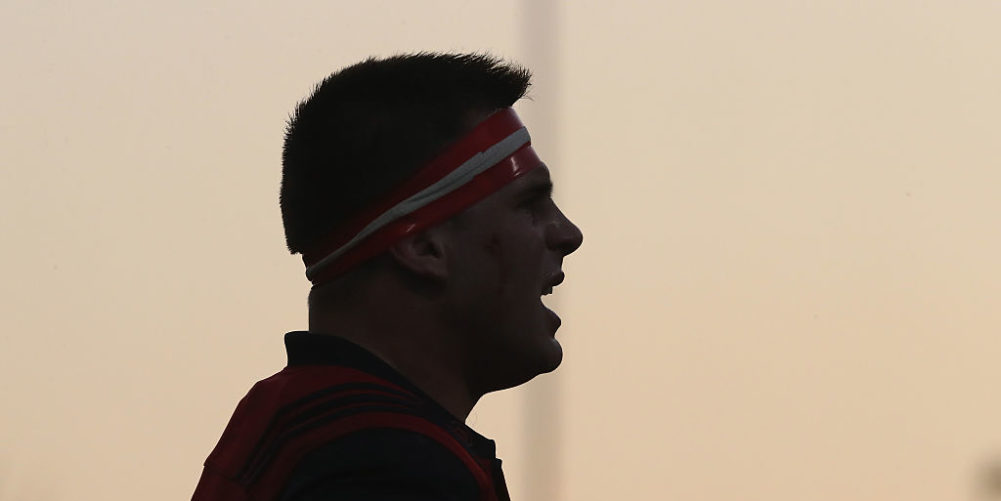Christiaan Johan Stander will long be remembered throughout the Kingdom of Kerry and every other square foot of Munster, his gallantry beyond question.
He will be remembered across the whole of Ireland for helping deliver a Grand Slam as well as something rarer still, victories over the All Blacks on both sides of the Atlantic. As if that's not enough, he was there in Auckland when Romain Poite's volte face allowed the Lions to escape Eden Park clinging to a drawn series.
Regrettably, CJ will also be remembered for his final act at Thomond Park, one which will have evoked a phrase from as written by Charles Dickens in Oliver Twist and spoken by Mr Bumble: “The law is an ass.''
Rugby Union may have been bumbling along making an ass of itself in that respect since first grappling with law and order in the same Victorian times but never, surely, quite as absurdly as in Limerick nine days ago.
Cardiff had brought a stirring contest against Munster to the boil in quest of the try which would have kept them on track for the finals of the Rainbow Cup at the expense of their besieged opponents. Stander's men were still standing, but only just, when their leader played the last card at his disposal, a new invention called The Captain's Challenge.
For the first 75 minutes of any match under the auspices of the PRO12-14-16, a captain could only challenge on matters of foul play and try-scoring. For the last five minutes, the law-makers, in their infinite wisdom, gave captains licence to make a challenge on any alleged technical offence, no matter how trivial.
Stander's exhausted platoon had been manning their try line with increasing desperation deep into red clock time when they gave away another penalty. Cardiff's onslaught, based on 23 phases with a 24th about to come, left Munster at the end of their tether.
It gave them a precious respite, long enough for word to have reached Stander that Cardiff's substitute scrum-half Lloyd Williams had nudged the ball back into a ruck just before the penalty. And so Stander played his Get-Out-Of-Jail-Free card.
It forced the TMO, Will Hodges, to find the relevant footage and the referee, Andrew Brace, to look at a touchline screen. Law 16, sub-section 4 (a) states: “A player must not return the ball into a ruck.”
Williams did so, albeit with a surreptitious tap, an offence which left Brace no option but to enforce the law, thereby ending the match. Neutrals watching from near and far on television had every reason to feel robbed of a thrilling finish.
How ironic that in bringing the curtain down on his illustrious time centre-stage at Limerick's most famous theatre, Stander brought the roof crashing down on a piece of legislation which the law-makers introduced as a means of making the game more exciting.
The chief executive of World Rugby, Alan Gilpin, had said so when a number of experimental laws, including the Captain's Challenge, were put into operation during Super Rugby Aotearoa in New Zealand in February.

When the PRO12-14-16 followed suit, Gilpin ‘applauded their enthusiasm'. The new laws, he said, would provide invaluable data and feedback to determine future advances to game spectacle and player welfare.
So much for the theory. It beggars belief that the laws committee of World Rugby did not consider how this might play out in practice, that a scenario such as the one at Thomond Park would happen sooner than later.
It cannot have occurred to them. Had it done so they would have restricted the Captain's Challenge to foul play and try decisions. Widening it to technical infringements during the last five minutes provided a can of worms which Stander was only too relieved to open.
In doing so, he did nothing wrong. Those Munster fans who would have been quick to condemn him had he not done so would doubtless have been crying foul had Cardiff been the ones in dire need of playing the same card.
“You don't want to end the game like that,'' Munster head coach Johann van Graan said. “Unfortunately, that's the law currently for this competition so you've got to use it.''
Had such recourse to justice been available to the 14 men of La Rochelle at Twickenham almost at the very end of the Champions' Cup final, they would have had a lineout five metres out with a sporting chance of the try to make Toulouse pay for their riskaverse strategy. Wisely, the organisers chose to give the Captain's Challenge a wide berth. They may have done so on the sensible basis that the game has gone a fair way towards covering as many bases as it can with three match officials, a TMO and a citing commissioner. On top of all that, every captain has the right to query any refereeing decision with the man himself. As if they haven't got enough detectives on the case, the new law empowers a 15- man force of narks, one side legally entitled to snitch on the other.
Law-enforcement, as in life so in rugby, can leave much to be desired, as in the French officials seeing nothing wrong with those first-half Welsh tries against England. In the end, there could be no denying that each team got what it deserved but the same argument could not be applied to Munster-Cardiff.
Rugby's tendency to be caught in its own law-making web means it is never too difficult for someone to find fault with something. Today's forensic examination would have erased two of the most famous tries of the last century – Sir Gareth Edwards' for the Barbarians against New Zealand, Serge Blanco's World Cup semi-final epic for France against Australia – because of forward passes.
The Captain's Challenge ought to be given the order of the boot.



























